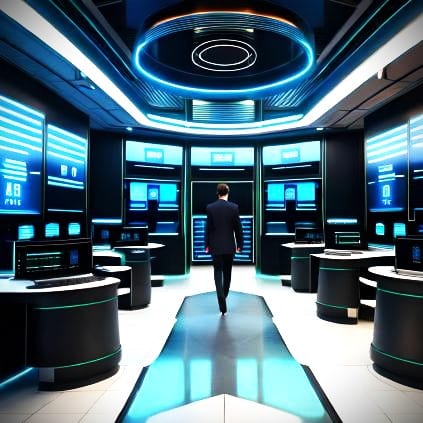Introduction
Artificial intelligence, often referred to as AI, is a branch of computer science that aims to create systems capable of performing tasks that typically require human intelligence. These tasks include problem-solving, learning, understanding natural language, and making predictions. AI software has become a driving force behind innovation, offering solutions that cater to diverse industries.
Healthcare: Transforming Diagnosis and Treatment
In the healthcare sector, AI has proved to be a game-changer. AI-driven algorithms can analyze vast amounts of medical data to assist in diagnosing diseases, predicting patient outcomes, and even suggesting treatment plans. This technology can identify patterns in medical images, such as X-rays and MRIs, with remarkable accuracy, helping medical professionals make informed decisions swiftly.
Finance: Enhancing Decision-Making
Financial institutions are harnessing the power of AI to analyze market trends, manage risks, and make investment decisions. AI software can process data at an unprecedented speed, providing valuable insights that aid in making strategic financial choices. Moreover, AI chatbots are becoming increasingly common in customer service, offering instant assistance and streamlining financial transactions.
Manufacturing: Streamlining Operations
In the manufacturing industry, AI-powered robots and automation systems are optimizing production processes. These machines can perform repetitive tasks with precision and work around the clock, significantly increasing efficiency and reducing errors. AI also enables predictive maintenance, ensuring that machinery is serviced before breakdowns occur, thus minimizing downtime. visit here
Marketing and Advertising: Targeting with Precision
AI software has revolutionized the way businesses market their products and services. By analyzing consumer behavior and preferences, AI can deliver personalized advertisements to individual users, increasing the chances of conversion. Ad campaigns can be optimized in real-time based on user interactions, maximizing ROI.
Retail: Personalizing Customer Experiences
The retail industry benefits from AI by providing personalized shopping experiences. AI-driven recommendation systems analyze customer data to suggest products that align with individual preferences. Chatbots and virtual assistants can offer immediate assistance, enhancing customer support and engagement. visit here
Education: Adaptive Learning
In education, AI is transforming the learning experience. Adaptive learning platforms use AI algorithms to tailor educational content to each student’s strengths and weaknesses. This personalized approach improves student engagement and performance.
Agriculture: Precision Farming
Agriculture is adopting AI for precision farming. AI-driven solutions can monitor soil conditions, weather patterns, and crop health, enabling farmers to make data-driven decisions. This not only increases crop yields but also minimizes the use of resources, making farming more sustainable.
Transportation: Autonomous Vehicles
The transportation industry is on the brink of a revolution with autonomous vehicles. AI-powered self-driving cars and trucks have the potential to reduce accidents, lower fuel consumption, and improve traffic flow. This technology could reshape the way we commute and transport goods.
Energy: Optimizing Resource Management
AI is aiding in optimizing energy resource management. Smart grids powered by AI can efficiently distribute electricity, reducing waste and costs. Predictive analytics also play a vital role in energy production and consumption, helping to meet the growing global energy demands.

Entertainment: Content Recommendation
Streaming platforms and entertainment services use AI software to recommend content to users based on their viewing history and preferences. This keeps viewers engaged and ensures they discover new content that aligns with their tastes.
Government: Enhancing Public Services
Government agencies are employing AI to enhance public services. Chatbots are being used to handle citizen inquiries efficiently, and predictive analytics assist in law enforcement and disaster management. AI is helping governments become more responsive and proactive.
Real Estate: Predictive Analytics
In the real estate industry, AI is used for predictive analytics to determine property values, assess market trends, and match buyers with suitable properties. This technology streamlines the buying and selling process, saving time and resources for both buyers and sellers.
Customer Service: Chatbots and Virtual Assistants
AI-driven chatbots and virtual assistants are becoming the face of customer service. They can provide 24/7 support, answer frequently asked questions, and resolve issues promptly. This not only enhances customer satisfaction but also reduces the workload on human support agents.
Conclusion
Artificial intelligence software has penetrated various industries, bringing about profound changes and enhancements. From healthcare to finance, from manufacturing to entertainment, AI has proven its potential to revolutionize operations and improve outcomes. As technology continues to advance, more industries are likely to harness the power of AI for their benefit. AI in game development,
Artificial intelligence is a field of computer science that focuses on creating systems capable of performing tasks that typically require human intelligence, such as problem-solving and learning.
AI in healthcare is used for diagnosing diseases, predicting patient outcomes, and suggesting treatment plans based on extensive data analysis.
Yes, AI benefits education by providing adaptive learning experiences, tailoring content to individual student needs.



One Reply to “AI Software, Which Industries Can Make Best Use it?”